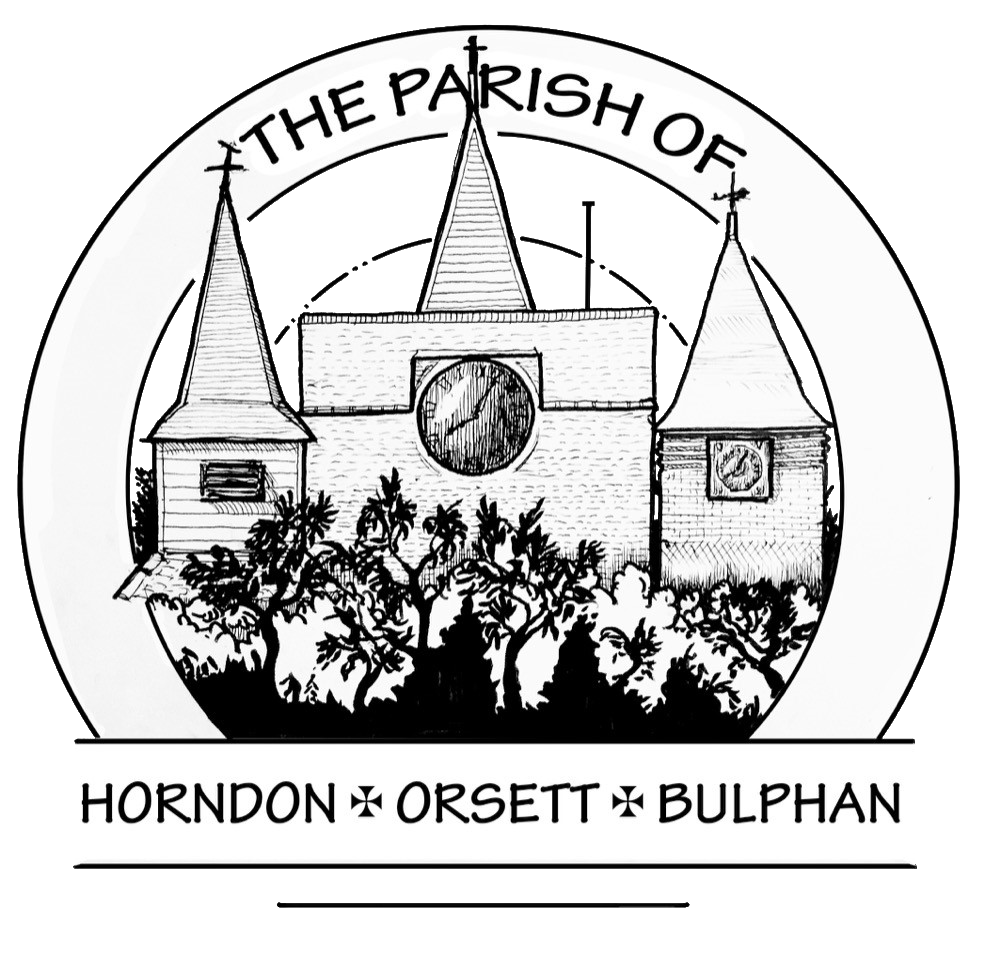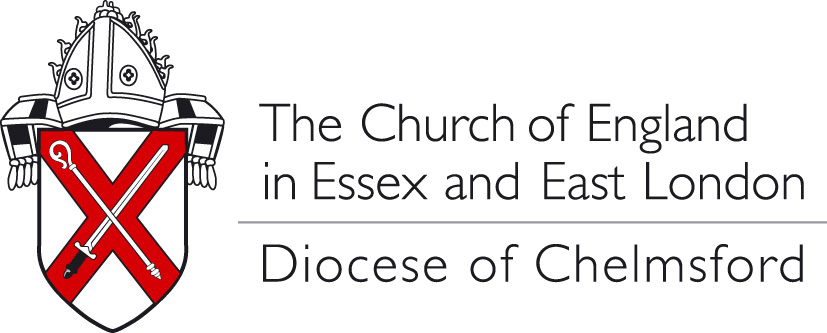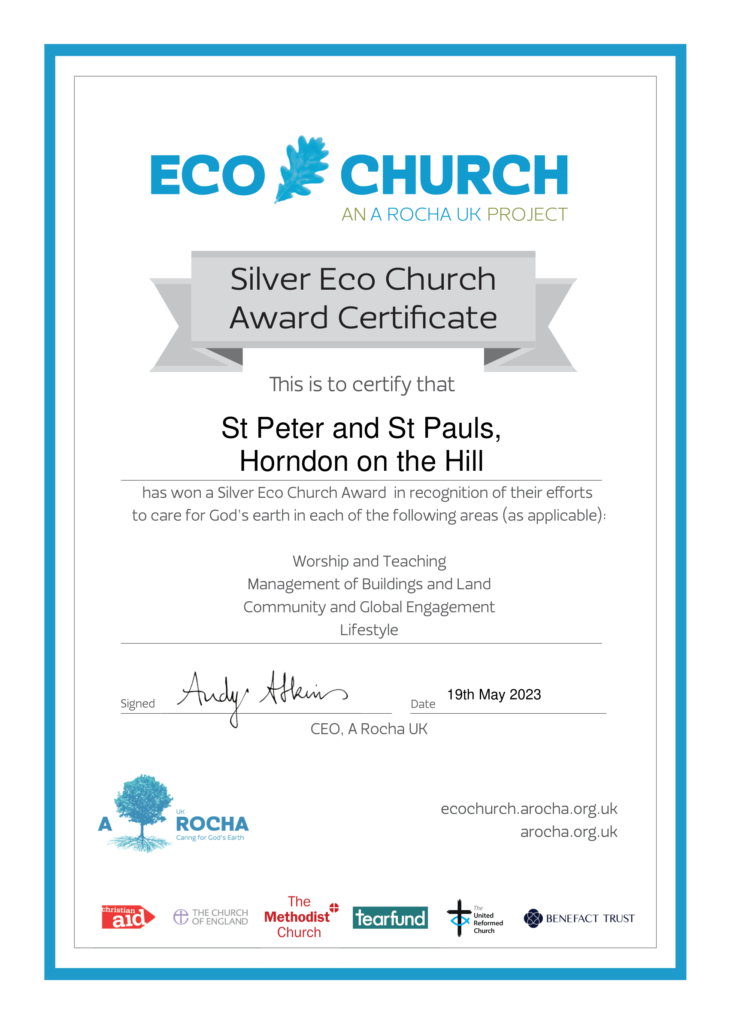
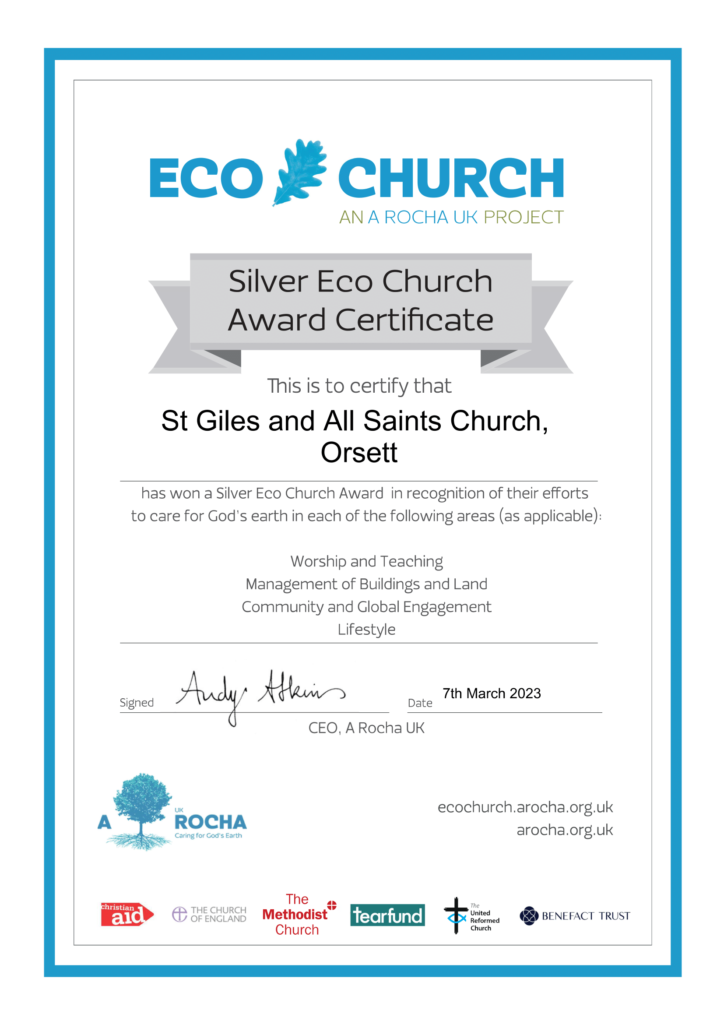
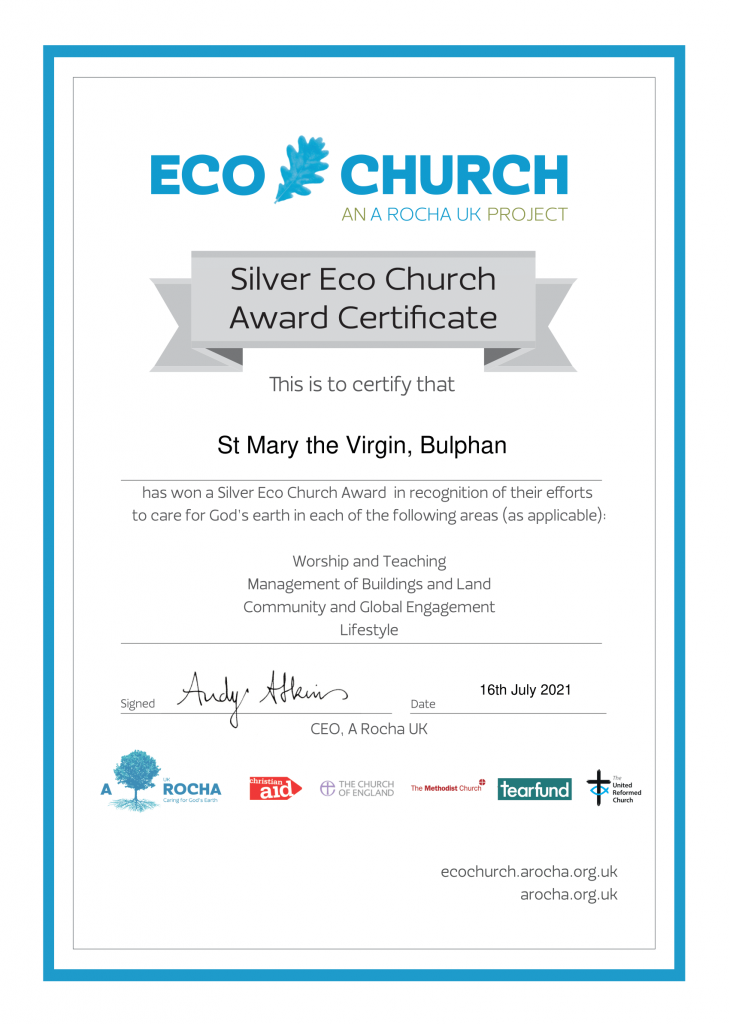
To achieve an Ecochurch award each of our Churches had to complete the unique online Eco Survey about how they are caring for God’s earth in different areas of their life and work. The answers a church provided collected points towards an Eco Church Award – the more each church did, the more points it got!
The survey takes us through five key areas of church life:
- Worship and teaching
- Management of church buildings
- Management of church land
- Community and global engagement
- Lifestyle
Below are some of the issues that have been discussed by our Ecochurch group.
What is Fairtrade?
The Parish has decided that we will always use Fairtrade tea, coffee and sugar and will use other Fairtrade products where possible.
Fairtrade is one simple way to spark change – and it starts with our choices. Choosing Fairtrade means standing with farmers for fairness and equality, and against some of the biggest challenges the world faces.
Fairtrade means fairer pay and more power in the hands of farmers, so that they can create change for us all, from investing in climate friendly farming techniques and clean water for their community, to nurturing women leaders and making sure children get an education. When you choose Fairtrade, you’re choosing the world you want to see.
With Fairtrade you have the power to change the world every day. With simple shopping choices you can get farmers a better deal. And that means they can make their own decisions, control their future and lead the dignified life everyone deserves.
For more details please visit https://www.fairtrade.org.uk/
What is Toilet Twinning?
The toilets in the three churches in the Parish are all part of this scheme.
By donating £60 to twin a toilet, you help fund a project in a poor community that will enable families to build a basic toilet, have access to clean water and learn about hygiene – a vital combination that saves lives.
When you twin, you are sent a certificate to hang in your loo – showing a photograph of your overseas toilet twin and GPS coordinates so you can look up your twin’s location on Google Maps!
For more details please visit https://www.toilettwinning.org/
What does LOAF mean?
LOAF stands for food which is:
Locally produced, Organically grown, Animal friendly and Fairly traded.
As a Parish we would like to encourage you to think LOAF when buying food.
To read more about this please visit http://www.christian-ecology.org.uk/loaf-principles.html
Reduce, Re-use, Recycle
The amount of waste we recycle has increased. But we are still behind some of our European neighbours, some of whom recycle over 70% of their waste. Plenty of recyclable waste still ends up in our landfills. Think of it as a waste hierarchy:
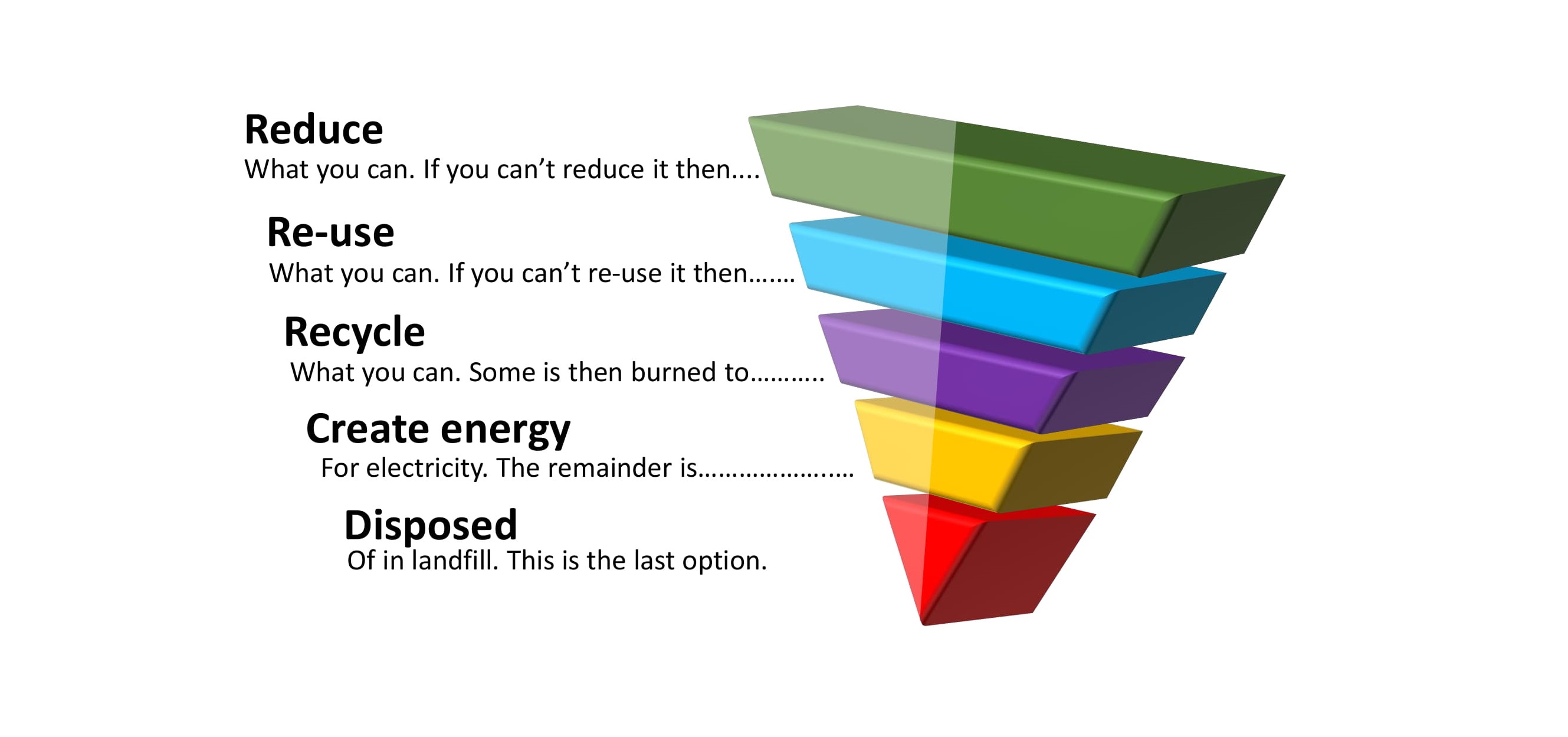
As well as basic paper, plastic, and glass recycling, think of ways to reduce and re-use your household or church waste:
-
Food waste (see above).
-
Textile waste: many councils and charities have textile recycling collection points (https://www.recyclenow.com/what-to-do-with/clothing-textiles-0)
-
Household item waste: do you have things that could be repaired rather than thrown out? You could take them to a repair café, or even set one up yourself. Or, if they are no longer needed, think about donating them to a charity shop or advertising them on Freecycle [link].
-
Water waste: treating water is an intensive process which contributes to our carbon footprint. Take a look at Water Wise (https://waterwise.org.uk/save-water/) for their tips on how to save water.
-
Energy waste (see below).
Part of reducing our waste is switching to a ‘circular economy’ mindset; working to get the most out of resources, rather than operating with a ‘use and dispose’ mindset.
Overseas Project 2024 - WaterAid UK
The Parish has committed to pray for a specific overseas environmental project and will select a different project each year.
In 2024 the selected Project is the charity WaterAid UK
When a community gets clean water for the first time, it’s the start of something truly life-changing.
Right now, millions of children around the world like children in Ethiopia don’t have clean water to drink, decent toilets to use or good hygiene to protect themselves. Without these basics, breaking the cycle of poverty is just a dream.
But when you help WaterAid dig a well or install a tap in a community, you’re changing the lives of children for the better. Your donation today, can help children to stay in school instead of wasting their precious childhood walking to collect water.
Together, with your help, we’ll keep working until everyone, everywhere has clean water, decent toilets and good hygiene.
The are an international not-for-profit, determined to make clean water, decent toilets and good hygiene normal for everyone, everywhere within a generation.
Since 1981, they’ve directly reached 28 million people with clean water; 28 million with decent toilets; and 26 million with good hygiene.
Only by tackling these three essentials in ways that last can people change their lives for good. With their supporters and partners, they will change millions of lives for the better.
They work closely with partners internationally and on the ground in some of the toughest places in the world, to help achieve widespread change. Millions of people have already taken control of their lives and built better futures.
They do more than install taps and toilets. To make lasting change happen on a massive scale, they convince governments to change laws; link policy makers with people on the ground; change attitudes and behaviours; pool knowledge and resources; and rally support from people and organisations around the world.
For more information or to make a donation please visit the WaterAid website – https://www.wateraid.org/uk/
Carbon footprint calculator
How to calculate and reduce your carbon footprint

James Martin
Content editor
Carbon – we’re all responsible for it. From the food we eat to the way we travel, every one of us leaves a carbon footprint trailing in our wake.
How to calculate your carbon footprint
Working out the emissions associated with every aspect of our lives is difficult, but government figures suggest the average UK person is responsible for 5.5 tonnes of carbon dioxide (CO2) emissions per year.* If you include other factors such as overseas flights and UK consumption of imports, plus the impact of other greenhouse gases, this figure may effectively double.
You can use Carbon Independent’s calculator to give you an indication of the impact of your diet, journeys and household energy. And Eco Passenger compares the energy consumption, CO2 emissions and other environmental impacts of planes, cars and trains.
How to reduce your carbon footprint
We’re all responsible for emissions, but there are things we can all do to reduce our carbon footprint too. Some key areas to think about are:
- Energy – Becoming more energy efficient will help to reduce your footprint. Limit waste and consider switching to a supplier that provides renewable energy.
- Food – Consider what you eat and where it comes from. Studies show that meat and dairy are the most environmentally damaging food types. Food produced in the UK is generally less carbon intensive than imported products.
- Retail – From fashion to furniture, everything we buy generates emissions. The easiest way to reduce your emissions is to simply buy less. When you do buy, choose second-hand items or purchase from sustainable retailers.
- Travel – Walking, cycling and public transport are all better alternatives to driving. Flying is carbon-intensive, so limiting the number of flights can really help reduce your footprint.
The power of trees
You can help fight climate change further by harnessing the power of trees. Each year an estimated 20 million tonnes of CO2 are absorbed and locked away by the UK’s existing trees and woods. The 1,000 woods in our care across the country make a significant contribution to this total.
Through a donation you can help us to look after our woods and ensure they lock up carbon for generations to come. Every £25 donated helps us protect and care for an area of woodland that has the potential to secure roughly 1 tonne of CO2. A donation of £137.40 would allow us to look after enough woodland to capture and store 5.5 tonnes of CO2, matching the figure for the average UK person’s yearly carbon footprint.
Making a donation will not directly reduce your carbon footprint, but it will help to mitigate your environmental impact. Of course, the woods you will help protect are much more than just carbon stores. They also provide homes for wildlife and places for people to visit and enjoy; a true win-win.
Ecosia, an ethical search engine
Ever heard of the Ecosia search engine?
Why chose Ecosia as your default search engine?
They use all their profits for climate action, with at least 80% financing tree-planting projects around the world: over 165 million trees planted to date. The remaining 20% is invested in renewable energy, regenerative agriculture and protecting trees around the world. Once planted, Ecosia continues to work with local partners and uses satellite tech and field visits to ensure the trees survive. Transparent financial reports are published on their website monthly.
But the not-for-profit business model and transparency is not the only thing that makes Ecosia a somewhat unusual search engine.
Ecosia has become one of the most privacy-friendly search engines out there – which means they don’t do creepy things like selling your data to advertisers or creating a personal profile of you. It doesn’t use any third-party tracking tools, meaning that any search made on the service won’t be seen by any party other than Ecosia. And any search made on Ecosia becomes anonymised after one week. (In contrast, Google and Bing will hold onto bits of search data, even after deleting browser history and cookies).
If you would like to make Ecosia your default search engine, go to https://www.ecosia.helpscoutdocs.com and click on the “Using Ecosia” button.
